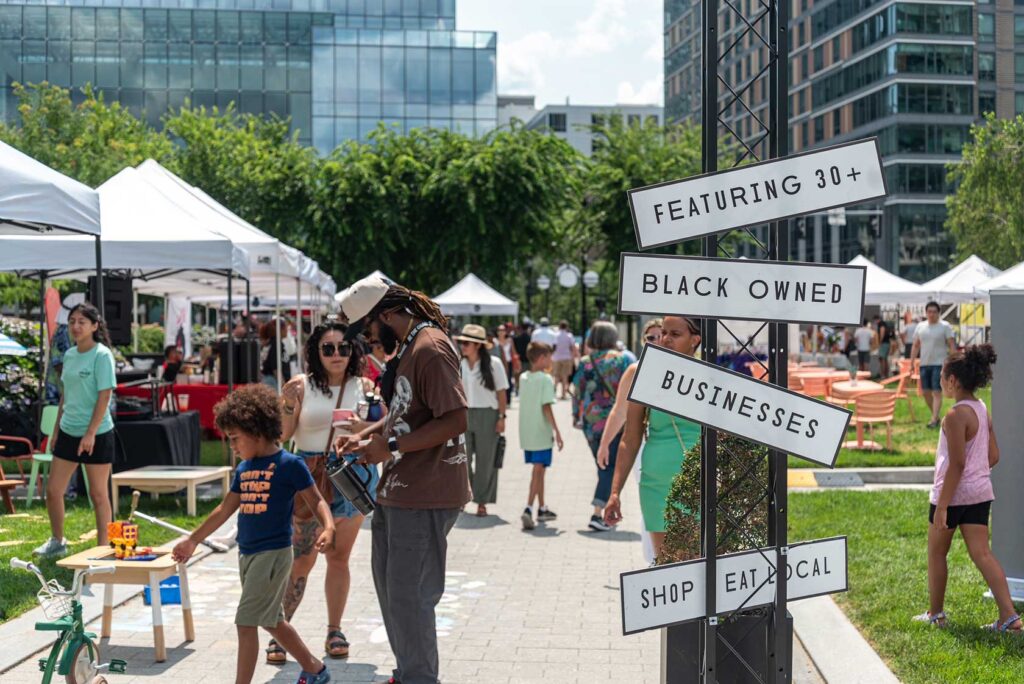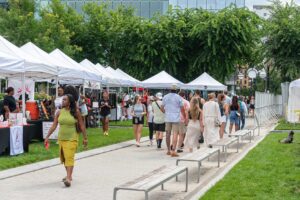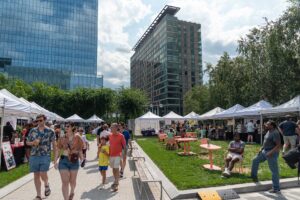
When Jae’da Turner founded Black Owned Bos., she didn’t intend it to become what it is today. In 2019, she wanted to create a space to amplify Black-owned small businesses in Boston and a way for locals and transplants alike to discover those businesses easily.
“It was really intended to be a resource of sorts and also creative expression, in a way,” said Turner, 33, whose background is in marketing.
Five years later, her passion project has blossomed into a full-grown business serving Black-owned businesses in Boston with a brick-and-mortar shop in the South End, called the Bos. Shop, and a regular annual spot among the Seaport District’s programming.
Every year, once a month from May to October, Black Owned Bos. hosts a pop-up in the Seaport, where Black small-business owners set up booths showcasing their products and offerings. The stalls are filled with samples of handmade soaps, plants, hot sauces, baked goods and more.

Every year, once a month from May to October, Black Owned Bos. hosts a pop-up in the Seaport. PHOTO: COURTESY BLACK OWNED BOS.
The idea for this pop-up — called Seaport x Black Owned Bos. Market — came from Turner’s cousin, Quontay Turner, owner of Emerald City Plant Shop in Norwood.
Quontay Turner had been organizing Black business markets at District Hall and introduced Turner to WS Development, the Seaport developer in charge of much of the neighborhood’s development and social programming. Soon after, Black Owned Bos. held its first outdoor market in the summer of 2020. Even in the face of pandemic restrictions, the pilot was a success, and the Seaport x Black Owned Bos. Market became a recurring event.
Over the last five years, about 125 different small businesses have participated in the market, Turner said. Many of the business owners have had a positive experience on the Seaport, making the most of the opportunity to connect with new customers who could potentially become repeat buyers. The markets are “inviting” and “warm” environments, Turner said, where entrepreneurs and visitors can connect while enjoying music courtesy of the resident DJs, DJ knszwrth and DJ Slick Vick.
“It’s all kind of one larger community and ecosystem of businesses that have been a part of the journey, which is exciting,” Turner said.
Adapting to shifting trends
While the market is going strong five years in, it has been affected by shifting consumer trends, Turner said. In 2020, following George Floyd’s murder and the ensuing protests in support of the Black Lives Matter movement, people flooded to small Black-owned businesses, Turner recalled.
Black Owned Bos. had already built a loyal following in 2019. The subsequent support in 2020, coupled with Black Owned Bos.’s outdoor programming, boosted the existing fanbase.
Simultaneously, “a lot of people had more disposable income to purchase something from a small business or spend a little bit more on something, and weren’t as concerned about the margins as I would say people are now,” Turner said.
Things have changed since then. As the years went by, Turner observed the fervent support of Black-owned businesses evident in 2020 and 2021 wane.
“I think, with it becoming less ‘trendy,’ but then also people having less to spend on it, it makes it even more of a challenge, and businesses have to get creative around their approach,” she said.
For Turner, that has meant being more intentional about how she spends time and financial resources. Initially, Black Owned Bos. was her only full-time gig. Now, she supplements it with her role as a program manager for a crowdfunding platform.
She has also changed Black Owned Bos.’ programming to ensure “that our platform has places that people can come to and build into their routine,” she said. In the beginning, she held more one-time pop-up-style events. Now, she’s shifted her approach to a more stable and predictable one. Loyal fans of Black Owned Bos. know that if they want to find Black Owned Bos. in person, they can make their way to the Seaport market once a month from May to October each year or stop by the Bos. Shop in the South End.
Having nailed down a consistent approach, Turner began to consider how to make the markets more exciting for visitors, knowing that people’s calendars fill up more rapidly now than they did in 2020 or 2021, when social restrictions were in place.
“How do we stand out and make it a destination for people to come back every month,” she recalled asking herself, “versus just kind of a pass-by or something exciting that they just found out about? … because that’s less likely now.”
To add a little variety, each Seaport x Black Owned Bos. Market is now themed, with an activation or giveaway to match.
This year’s season kicked off with “Rhythm and Blooms” which entailed a floral photo booth and free mini-bouquets by a local Black-owned florist. The “Cookout” theme featured instructional line dances from the Boston Rhythm Riders. For “Island Style,” the DJs made Soca music the main sound in their sets. In September and October, the themes will be Fall Fest and Hearty Harvest, to usher in the changing season.
These additions, along with staying consistent with the branding and marketing and building relationships, have helped Black Owned Bos. stay “relevant,” Turner said. Even after the trend of supporting Black-owned businesses cooled, Black Owned Bos. remained a stopover for people who are intentional about supporting Black-owned businesses or who want to “diversify their own spending,” she said.
A ‘stepping stone’
The Seaport x Black Owned Bos. Market has also yielded further opportunities for the participating business owners. Some of them have secured longer-term pop-up spots in The Current, the Seaport’s revolving door of pop-up businesses. Others have invested more time into their Black Owned Bos. involvement or participated in Snowport, the Seaport’s holiday market, allowing them to reach new and larger audiences.
Turner’s hope for the Seaport x Black Owned Bos. Market is “for it to continue to be a stepping stone for other businesses,” she said. The ultimate goal, she added, would be one of the small-business owners “getting a permanent space in any of the Seaport vacancies.”







